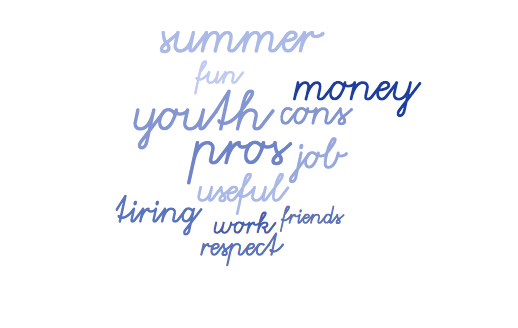Summer Jobs – Take It Or Leave It?

Getting a job is a rite of passage that most teenagers in America face as they navigate through high school, whether they’re in a position where they need to support themselves financially or because they’re simply following the pack. Typically, a teenager gets their first job the summer before their junior year, when they have turned 16 and are able to drive themselves to work.
This important, coming-of-age decision in a high schooler’s life is one that should be thought out beforehand—especially for those who have the luxury to put their comfort first and stay away from the workforce for the time being. Ask yourselves: Is it worth the commitment? Am I ready for this much responsibility? Consider the following pros and cons of getting a summer job!
The Advantages of Getting A Summer Job
- MONEY.
The word alone is enough said. Getting a job over the summer means you can indulge in whatever summer treats you desire—trips with friends or family, local outings (ex: the Alameda County Fair), food, etc.
You can also choose to save your money for the coming school year. Your earnings can be used to fund an expensive school trip that you know is coming up, the overpriced school and class spirit shirts that you’ll probably end up buying, the school supplies that you’ll need to stock up on, the upcoming games and dances you might be attending… The expenses go on and on.
- People respect and admire youth that have joined the workforce.
When the word gets out that you have a job, you will be regarded as a mature young adult by friends, family, acquaintances. It’s nice to feel like you are taken seriously.
- Summer can be boring—at least you’re doing something useful.
Sure, summer is fun, but there are people whose schedules become dull over the two month break. If you’re the type of person that needs to keep busy, a summer job is the thing for you. Work will fill up your agenda, keeping you occupied and getting you paid while you’re at it.
The Disadvantages of Getting A Summer Job
- It’s hard to see friends.
This one is most common in the cons of working over the summer, but that doesn’t make it any less true. Work takes commitment and responsibility, so if you say you’re available to work, you have to stick to it. There’s no backing out last minute if you want to keep your job.
Chances are you’ll have to miss at least one fun event you wanted to attend because you’ll be scheduled to work. Be prepared to be the friend that always has to cancel last minute. This is especially true when you’re a teenager in the workforce, as jobs are less permanent and less consistent. Your work schedule is likely to be all over the place for the first couple of weeks, and by the time it’s stable, summer will be over. Sure, you can request time off, but if you’re working in a place that hires other teenagers, there will be plenty of others wanting to take off for the weekend, too.
- Work is TIRING.
It may seem obvious, but in the excitement and novelty of your first job, it’s easy to forget that you actually have to work. All of the interviewing, work permits, uniforms, money, and new coworkers can distract you from the main purpose of this endeavour—putting in the hours.
This ties in with the difficulty of seeing friends. Even if you are lucky enough to have a shift that doesn’t overlap your plans, heading straight from a long shift to a friend’s party can knock you out. From personal experience, you might even be the person that ends up asleep on the couch while everyone else is having a good time. If you have the strength to stay awake, the fatigue can make you less fun to be around and it can even be bad for your health. You’ll have to sit some out every once and awhile.
- Work can become dreary/monotonous.
In comparison to all of your fun summer plans, work can sometimes get boring. Why would you want to spend your summer break doing something that almost feels like school (However, you are getting paid for your suffering)? Some are lucky enough to spend their time at jobs that they enjoy, but there will be times when you can think of a million different things you’d rather be doing.
You’ve heard the pros and cons, so next summer, the choice is up to you. Will you take it or leave it?
Your donation will support the student journalists of Dublin High School. Your contribution will allow us to purchase equipment and cover our annual website hosting costs.


































